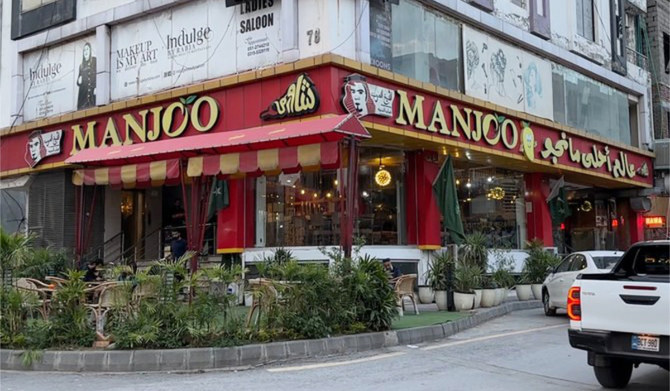RAWALPINDI: Waiters prepare shawarma platters in the bustling kitchen while eager customers wait to collect their orders in the dining room outside, enveloped in the aroma of skewered meat and spicy rice.
This is the scene at Manjoo, a fast-food chain set up four years ago in Rawalpindi by two Pakistani brothers who grew up in Saudi Arabia and in 2009 opened the restaurant’s first branch in the Kingdom.
Popular dishes on the menu include shawarma, which is seasoned meat and condiments served on pita bread; mandi, a meat and spicy rice dish; and fatayer, small, triangular-shaped pastries filled with spinach, cheese, meat, or a combination of these ingredients.
Sheikh Tahir, one of the brothers who set up the Rawalpindi branch, said his family moved to Saudi Arabia before he was born and set up various businesses there, including automobile showrooms and mobile phone shops.
“We had other businesses there (in Saudi Arabia) but (the younger generation) always wanted to open a restaurant,” Tahir told Arab News.
That dream materialized in 2009 when the family opened its first Manjoo branch in Madinah.
FASTFACT
To ensure Manjoo does not lose its authentic taste, chefs are brought in from Saudi Arabia.
Over time that one branch grew to five across Saudi Arabia before the family decided to open a branch and a food truck in Pakistan.
Tahir explained the origins of the restaurant’s name.
“Manjoo means mango in Arabic,” he said, adding that Saudi mangoes are cherished fruits available throughout the year.
“In 2009, before we opened the restaurant, we randomly chose this name, and it quickly gained fame.”
Tahir’s family was skeptical at first whether a restaurant that offered food from the Middle East would be a hit in Pakistan. But the response from customers was “overwhelming,” the owner said, a reaction he credited to a growing taste for Middle Eastern cuisine in Pakistan.
“Earlier, people in Pakistan were not acquainted with Arab food, but now many such restaurants have opened up,” Tahir said. “This food is liked by the people because it’s light and has very few spices.”
To ensure the restaurant does not lose its authentic taste, Tahir brings in chefs from Saudi Arabia. And the customers love it.
“I come here at least twice a week,” customer Ali Fayaz told Arab News. “Having spent a lot of time in Saudi Arabia and other Arab countries, my taste buds are accustomed to their cuisine.”
After more than three years frequenting the eatery with his family, Syed Noman Sarwar, another customer, praised the restaurant for maintaining consistency in taste and quality.
“I have tried KFC, McDonald’s,” he said, “but nothing compares to the taste of Manjoo.”
























